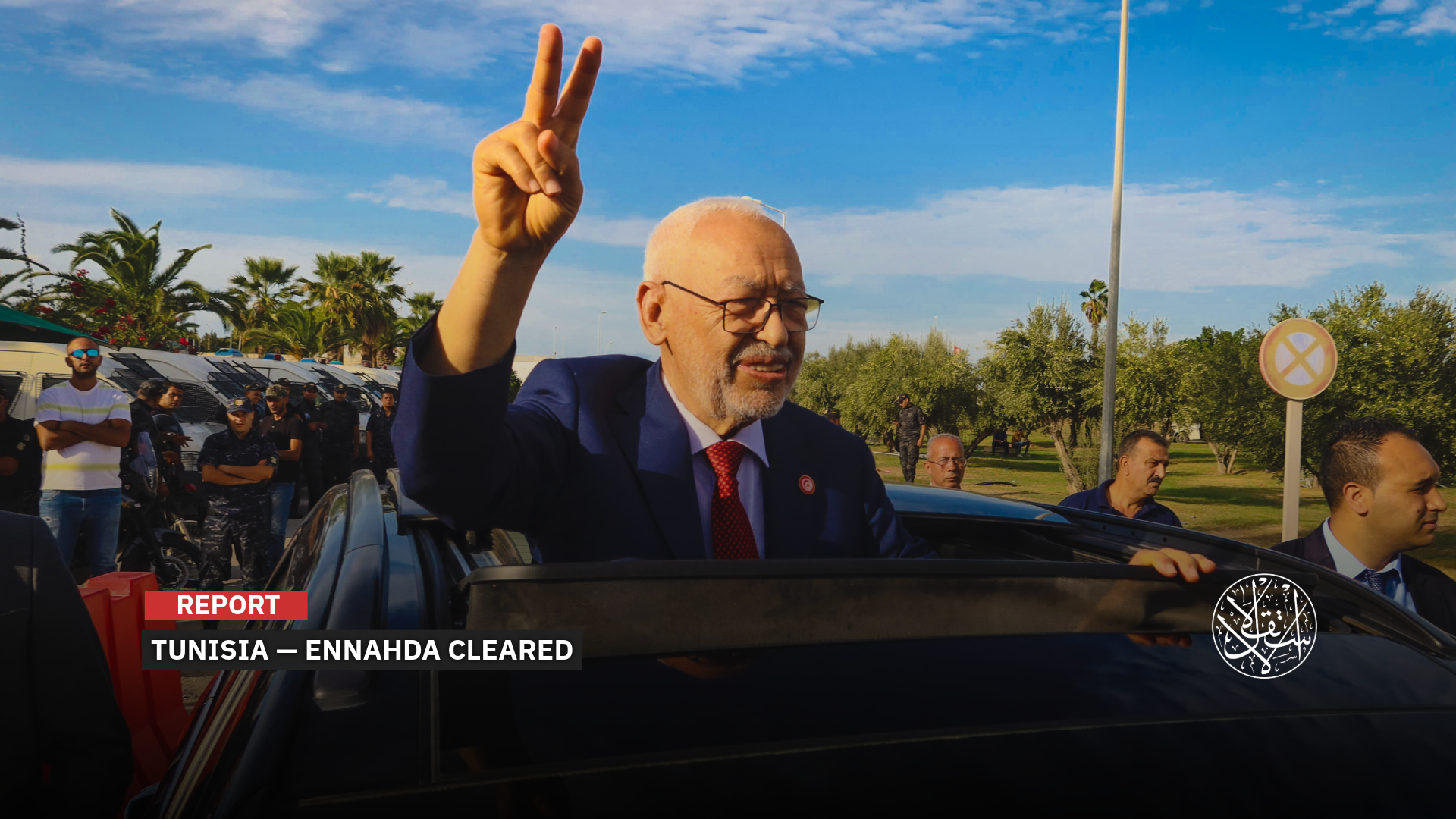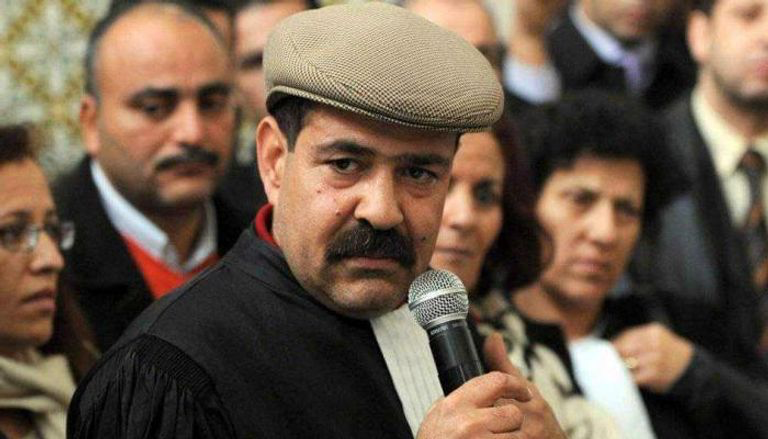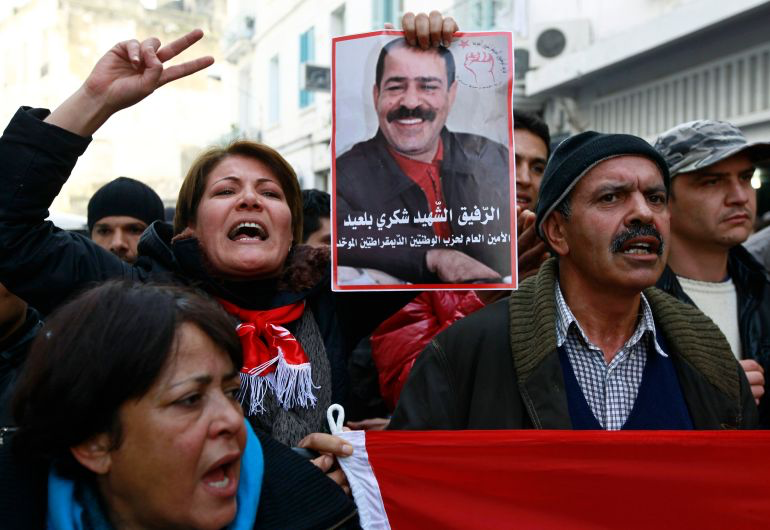Tunisia’s Most Notorious Assassination Case: Did the Final Verdict Clear Ennahda of Belaid’s Blood?

“The real killer is somewhere else, smiling from across the border.”
After years of anticipation on Tunisia’s streets, the country’s most politically charged murder case has finally reached its conclusion. The Court of Appeal’s terrorism chamber in Tunis delivered its final verdicts on October 14, 2025, convicting 24 defendants in the assassination of lawyer and leftist leader Chokri Belaid, while officially clearing the Ennahda Movement of any involvement in his killing.
The court handed down sentences ranging from four years in prison to life imprisonment for four defendants and imposed the death penalty on two others, marking the end of a judicial saga that began with Belaid’s assassination on February 6, 2013.
Belaid, secretary-general of the Unified Democratic Patriots Party, was gunned down in front of his home in the Tunis suburb of el-Menzah VI by two men on a motorcycle.
A Shock to the Political System
The killing sent political shockwaves across Tunisia and deepened divisions in its fragile post-revolution landscape.
For years, the case stumbled through courts and inquiries before being revived two years ago, according to Agence Tunis Afrique Presse.
Belaid’s family and several left-wing politicians had long accused senior Ennahda figures, the ruling party at the time, of orchestrating the assassination, an allegation the movement has consistently denied.
The verdict now closes a dark chapter in Tunisia’s political history, yet many still wonder who truly benefited from silencing Belaid’s voice.
The assassinations of Chokri Belaid and nationalist opposition figure Mohamed Brahmi, who was killed on July 25, 2013, were later claimed by former members of the Ansar al-Sharia group who joined the Islamic State at the end of that year.
Belaid’s killing, born on November 26, 1964, sent political shockwaves across Tunisia. The government described it as a crime against the entire nation.
A native of the working-class Djebel Jelloud neighborhood in southern Tunis and a member of a Marxist-Leninist faction, Belaid first rose to prominence during his high school years and later at university in the mid-1980s, where he became an active member of the National Democratic Students group.
After the 2011 revolution that ousted former president Zine el-Abidine Ben Ali, Belaid brought his political current out of hiding. He began working openly through unions and co-founded the Unified Democratic Patriots Party with several of his comrades.
Although he failed to win a seat in the 2011 Constituent Assembly elections, heading the Dignity Coalition list alongside the Arab Democratic Vanguard Party, the setback did not slow his political rise.
In 2012, he helped form the Popular Front, a coalition of leftist parties that stood firmly against the ruling “Troika” alliance, which included the Ennahda Movement and the two secular parties, the Congress for the Republic and the Democratic Forum for Labour and Liberties.

Ennahda Responds
As soon as the court’s verdict was announced, the Ennahda Movement moved quickly to assert that the ruling came after more than twelve years of what it called “false and malicious accusations” against the party and its leader, Rached Ghannouchi.
In a statement issued on October 15, 2025, Ennahda said the verdict “confirms beyond any doubt the clearing of the movement and its president and exposes the baseless nature of the accusations fabricated against them.”
The movement emphasized that the final list of convictions did not include any direct or indirect charges against any of its members, regardless of their position or level of affiliation.
“This confirms to both national and international public opinion what we have always stated,” the party declared, “that this case was exploited by exclusionary forces seeking to tarnish Ennahda’s reputation and turn public opinion against it through unethical means, in a desperate attempt to undermine its moral and symbolic standing in the conscience of the Tunisian people.”
Ennahda also accused those representing the civil plaintiffs of deliberately prolonging the case by repeatedly requesting delays and missing court sessions in order to manipulate public perception against a political rival they had failed to defeat through legitimate political or popular means.
The party stressed that “no one can falsely claim that this verdict resulted from a judiciary under Ennahda’s influence.”
“The ruling,” the statement concluded, “was issued while the movement is outside power, standing in opposition, and amid an increasingly authoritarian political climate hostile to democracy—a reality that strips away any claim that the process was controlled or biased in our favor.”
In the same context, former Foreign Minister Rafik Abdessalem noted that despite years of political and media incitement and what he called the excessive exploitation of bloodshed, the court ultimately sentenced 22 defendants in the Belaid case to punishments ranging from death to life imprisonment and long prison terms, and not a single one of them was an Ennahda member.
Abdessalem stressed in a Facebook post on October 14 that the entire affair was nothing more than what he called a leftist ploy aimed at sabotaging Tunisia’s democratic experience and paving the way for coup supporters and chaos.
Belaid Family Reaction
Responding to the verdict, the slain lawyer’s brother, Abdelmajid Belaid, said the family was not surprised by the latest appeal court rulings, which he described as routine.
However, he expressed astonishment at what he called the omission of the second part of the case file, which involves former Interior Minister Ali Larayedh, Mustapha Khedher, and several security officials, and the court’s decision not to merge the two files.
He added that this part of the case has been left unresolved and hasn’t been treated with the seriousness it deserves.
He explained that investigators had split the case in two, one file for the gunmen who pulled the trigger and another for those suspected of planning and ordering the hit.
Belaid then raised a sharp question: why has the file implicating former Interior Minister Ali Larayedh, a key piece of the case, been left to gather dust?
He accused the Ennahda Movement of direct complicity and publicly challenged Justice Minister Leila Jaffel to reveal “who is blocking the investigation into the part of the case that could finally expose those who gave the orders.”

Political Clearing
Commenting on the fallout from the final verdicts, Maher Madhioub, former aide to the Speaker of the Tunisian Parliament (2019–2024), emphasized that the rulings in the Chokri Belaid case “confirm the integrity of the state institutions and the political system during the democratic transition period from 2011 to 2021.”
Madhioub told Al-Estiklal that this judicial decision, issued in what he called “the most serious terrorist crime in modern Tunisian history,” also underscores the national integrity of Rached Ghannouchi, portraying him as a statesman committed to dialogue, democracy, and enlightened Islam.
He noted that the court explicitly affirmed the innocence of Professor Rached Ghannouchi, leader of the Ennahda Movement and Speaker of the Parliament (2019–2024), from all false political allegations and from any attempts to drag his name unfairly into cases of murder or terrorism.
“The ruling condemned members of the armed wing of Ansar al-Sharia, which had been designated a terrorist organization by the Tunisian government in August 2013, based on their proven direct criminal responsibility,” he added.
Political and Islamic activist Radwan Masmoudi also hailed the verdict, telling Al-Estiklal that “this judgment exposes the biggest lie in modern Tunisian history, the accusation that the Ennahda Movement and the moderate Islamic current were responsible for Belaid’s assassination.”
He described the accusation as “a fabrication created by malicious actors, spread by polluted media machines and unprofessional, unethical defense teams, meant to sow hatred and discord between Tunisia’s left and Ennahda.”
“It was a lie fueled by savage internal and external forces that wanted Tunisia to remain hostage to division and chaos, turning Tunisians against each other.”
“Tunisia paid the price for twelve years of doubt, hostility, and division, while the real killer was elsewhere, smiling from across the border,” Masmoudi said, alluding to unnamed foreign actors involved in Belaid’s assassination.
The political activist’s remarks about internal division recall the widespread unrest that erupted in Tunisian cities following Belaid’s killing, where Ennahda offices were set ablaze in Monastir, Sousse, Kairouan, and Gafsa.
Despite repeated denials from Ennahda leaders, Belaid’s supporters and family refused to listen, while Ghannouchi accused remnants of the former regime of orchestrating the assassination.
The murder coincided with the presence of then-President Moncef Marzouki in Paris, who cut short his visit and, before returning home, delivered an impassioned speech to the European Parliament in Strasbourg. He declared that Belaid’s assassination was aimed at derailing the Tunisian revolution.
Marzouki called the killing “a shameful assassination of a political leader and old friend, a threat and a message we will not accept,” and upon returning to Tunisia, he ordered flags to be flown at half-mast in mourning for Belaid.
Faced with the accusations, Ennahda found itself on the defensive. Hamadi Jebali, then Prime Minister and party leader, publicly reaffirmed the movement’s complete innocence. Yet his statements went largely unheard, ultimately contributing to his decision to resign.












